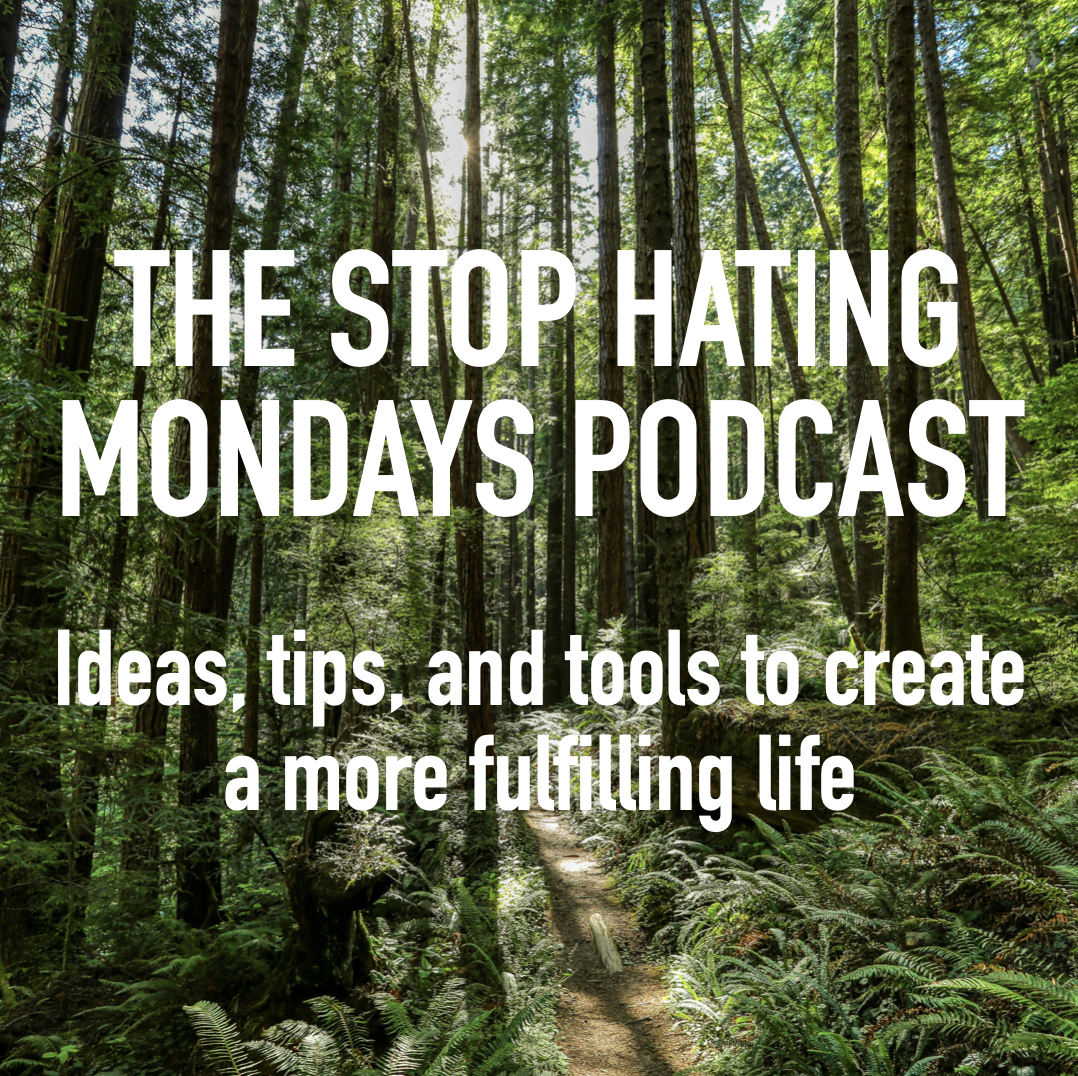How to find Your Passion: Figure Out You
Kent R.
There is a familiar pattern that many people fall into when they recognize that they are unfulfilled and ready for something better.
It goes something like this…
First, they have the feeling that something is off. That's the feeling of being off purpose that stirs up a desire to find their passion.
Then they decide to change. They know that what they are currently doing isn't making them feel fulfilled, so they make the big decision to try something else.
The change brings a sense of hope and exhilaration, but it doesn't last. Before long, they start feeling something that is all-too-familiar – like something is off and that they could be more fulfilled.
Rinse. Repeat.
So how does somebody who is willing to make big changes in their life to find their passion break free from this cycle of unfulfillment?
Two words. Strengths and Values.
On this episode of the Stop Hating Mondays podcast, we’re getting into how to figure out your strengths and values because, without them, it's almost impossible to find your passion.
TRANSCRIPT
(Transcripts are auto-generated and may contain minor errors)
Caanan
There's a familiar pattern that many people fall into when they recognize that they are unfulfilled and ready for something better.
It goes something like this.
First, they are the feeling that something is off. That's the feeling of being off purpose that stirs up a desire to find their passion. Then they decide to change. They know what they are currently doing isn't making them feel fulfilled, so they make a big decision to try something else. That makes sense. The change brings a sense of hope and exhilarate.
But you know what? It doesn't last.
Before long they start feeling something that is all too familiar. Like something is off and they could be more fulfilled.
Rinse, repeat.
So, how does somebody who is willing to make big changes in their life to find their passion break free from this cycle of unfulfillment?
Two words: strengths and values.
I’m Caanan, here with Kent. On this episode of the Stop Hatting Mondays podcast, we're going to get into how to figure out your strengths and values. Because without them, it's almost impossible to find your passion.
Kent
What you were saying there in the intro to me can be defined by saying throwing spaghetti at a wall and hoping something sticks. And that pattern you're talking about… You know, so many people… We've worked with so many people professionally who… that's how they operate. We discussed in the first episode, the foundations. What keeps people in this mindset?
All of the things pulling at our attention doesn't leave you much time to commit to the journey that passion / fulfillment / purpose require. So, this is about breaking that cycle and the first step in breaking that cycle is to pay attention to your actions.
What does paying attention to your actions do? It points towards your strengths.
Your strengths, by the way, are your innate talents and attributes. The things that come most naturally to you.
Caanan
Yeah, I'm going to say it again because it's so important.
Strengths are innate talents and attributes. They're the things that come most naturally to you.
I think a lot of people don't even really know what strengths are, so it makes it hard to even determine your strengths. But now you know.
You also know in your life when you're naturally using a strength or when you're not. I think of it as the difference between swimming upriver or, you know, being in the flow of the current. When you're not employing your strengths in your life you feel the constant work – that's the trudging water, and if you can recognize that moment in your life by paying attention to your actions, you have a really good insight into an area where maybe you're not using your strengths.
Ultimately, if you're paying attention to those points in your life where you really are going with the flow, or you're finding the flow and you can lose all track of time doing something, well, *ding ding ding* it's really likely you found a strength.
Kent
So how do you pay attention to your actions?
To figure out what your strengths might be, and I just want to pop in here and say our usual disclaimer for this podcast… We synthesize, you know, some things that can really take a lot of time to thoroughly work through the process in the right way. In our podcast episodes, we give nuggets to get you started so that you have something that can help you accomplish what the theme of that podcast is about.
So, here's an example of that. Pay attention to your actions by noting your actions. A lot of people like to write down what they do in a day. As part of this exercise, a lot of people will do an e-version of it. But we just ask people to commit for two weeks to writing down all the activities in your day. And then you're reflecting on what gives you energy.
What are things that you enjoyed? What are things that you could do without stopping? And what are things that are just annoying and tedious?
Spoiler Alert! One of the big findings here typically is the amount of time people realize they're spending on things that they feel are providing them nothing. So, an example of that would be tasks at work and conversations at work that run way too long. Time on social media is a massive one. And time paying attention to friends and buddies that completely deplete you and don't provide you anything to make your life better.
So what you're doing is by paying attention to your actions and writing these things down, noting these things, you are getting pointers to what your strengths are. Because the things that you love doing things you could do without keeping track of time… Those are clues – the very beginning stages of clues – to your strengths.
Kent
So first we had pay attention to your actions. Now we're going to get in to pay attention to your reactions. Why? Well, just like strengths provide clues… Sorry, just like your actions provide clues to your strengths (and weaknesses, really), paying attention to your reactions provides clues about your values.
What are your values? They're your guiding principles. They're the aspects of life… the things that truly matter to you.
We talk to clients about this in terms of values being those things that quickly engage a reaction from your mind, your heart, sometimes your body. Your reactions to things point you towards your values.
Caanan
Yeah! And when you are doing something that is not aligned with your values, you know it. Yeah, like in the last example with strengths, you have that when you're not using your strengths you have that feeling of trudging upstream. When you're not aligned with your values – or you're making decisions that are not aligned with your values – that is a different feeling. It's a feeling of dis-ease and you know it if you get quiet. You know. You know when you're not making decisions that are aligned with your values or when you're taking actions that are not aligned with your values.
Kent
Yeah, similarly this is something – I'll add here – that this applies to work groups as well. Because I know a lot of our corporate and workgroup clients listen to the podcast. Workgroups often can find that the group isn't working in alignment with the values of the workgroup. So, it's usually best to figure these things out on yourself first so you have an idea of strengths and values and how to access them via paying attention to your actions and reactions. But, again, this applies to workgroups as well.
So, the work you do here can be very useful across not only your personal life, but your professional life as well.
Kent
OK, so tip number one… We've talked about paying attention to your actions. Tip number two… we talked about paying attention to your reactions. Those point you again to your strengths and your values.
Now tip number 3 is: ask the question, “does it align with my strengths and values?”
So as different things come up in your life and you have this foundational work of getting in touch with your strengths and values done, you can actually begin to – as things rise in life – ask, “OK, does this align with what I'm learning about my strengths and values?”
So questions about… Do I consider this promotion? Do I consider leaving this company? Do I consider approaching my boss about X problem or a raise. Any number of things in your personal life.
Caanan
Now you have a framework for actually answering those questions in a way that is going to bring you closer to purpose and passion and fulfillment, where – before – if you even had the instinct to ask, “does it align with my strengths and values?”, well, how would you know if you didn't know your strengths and values first?
This is an incredibly important step in the process of getting on purpose, finding your passion, and it's fundamental to ending that hope/disappointment cycle – that vicious cycle that we talked about in the opening. So know your strengths and values allows you to both ask and answer, meaningfully, this important question.
Kent
Yeah, it doesn't align with my strengths and values, so this “strengths and values portion” is just a piece of the puzzle. It's the first piece in the puzzle but accessing this alone will open up so much to you. With the clients and workgroups that we work with, oftentimes, we won't even move past this step. This will provide so much opportunity for individual and work group growth that there's a lot of time that'll pass before we even move on to other steps. So this first series of exercises is unbelievably valuable.
Caanan
You could sit here for a long time and it would not be a waste of your time.
Caanan
So we talked about figuring out your strengths and values… the tips there were: For strengths, pay, attention to your actions. For values, pay attention to your reactions. And then our third tip; now that you know your strengths and values, you can ask yourself the question “does it align with my strengths and values?” and you can actually answer that question.



